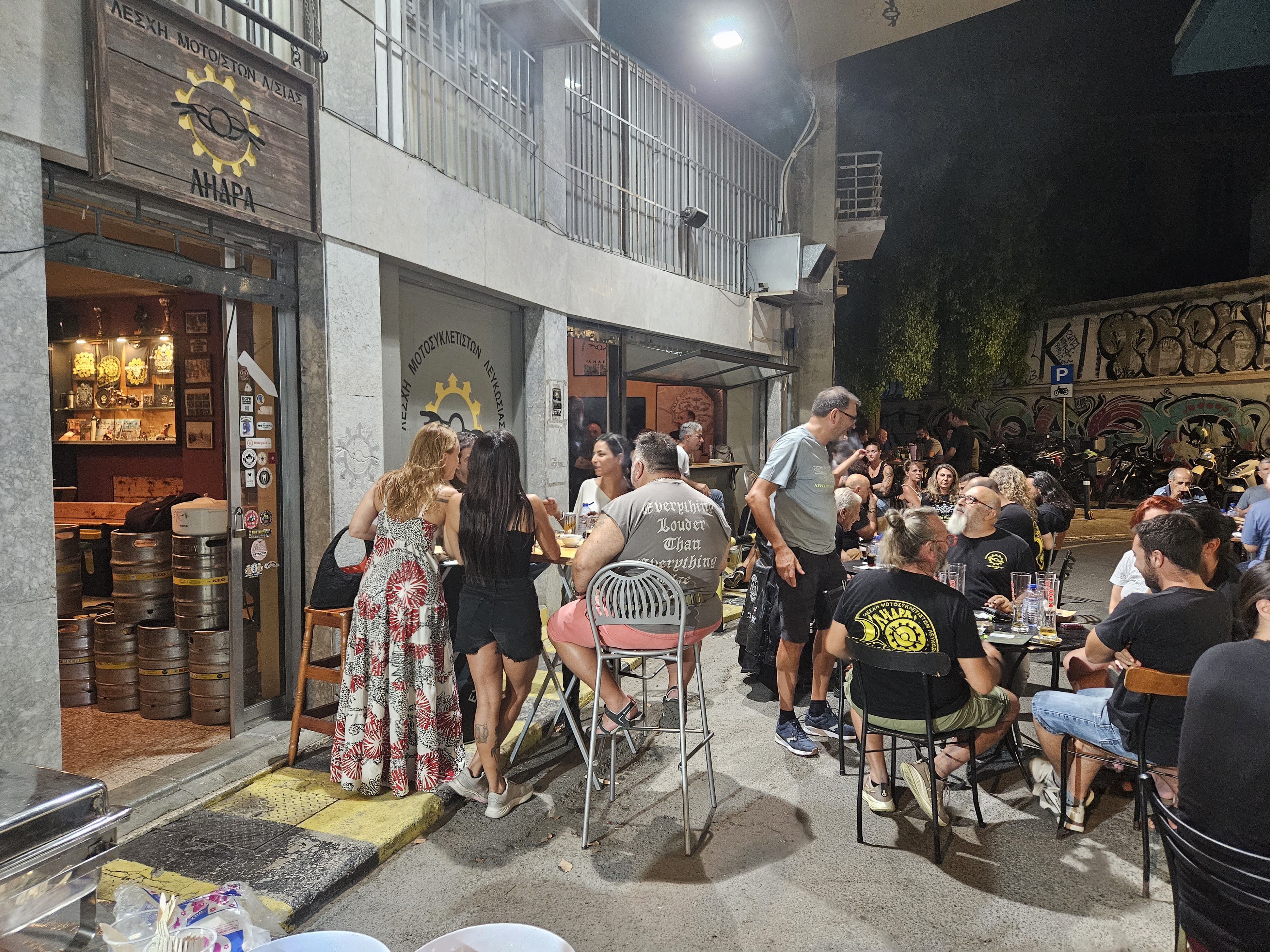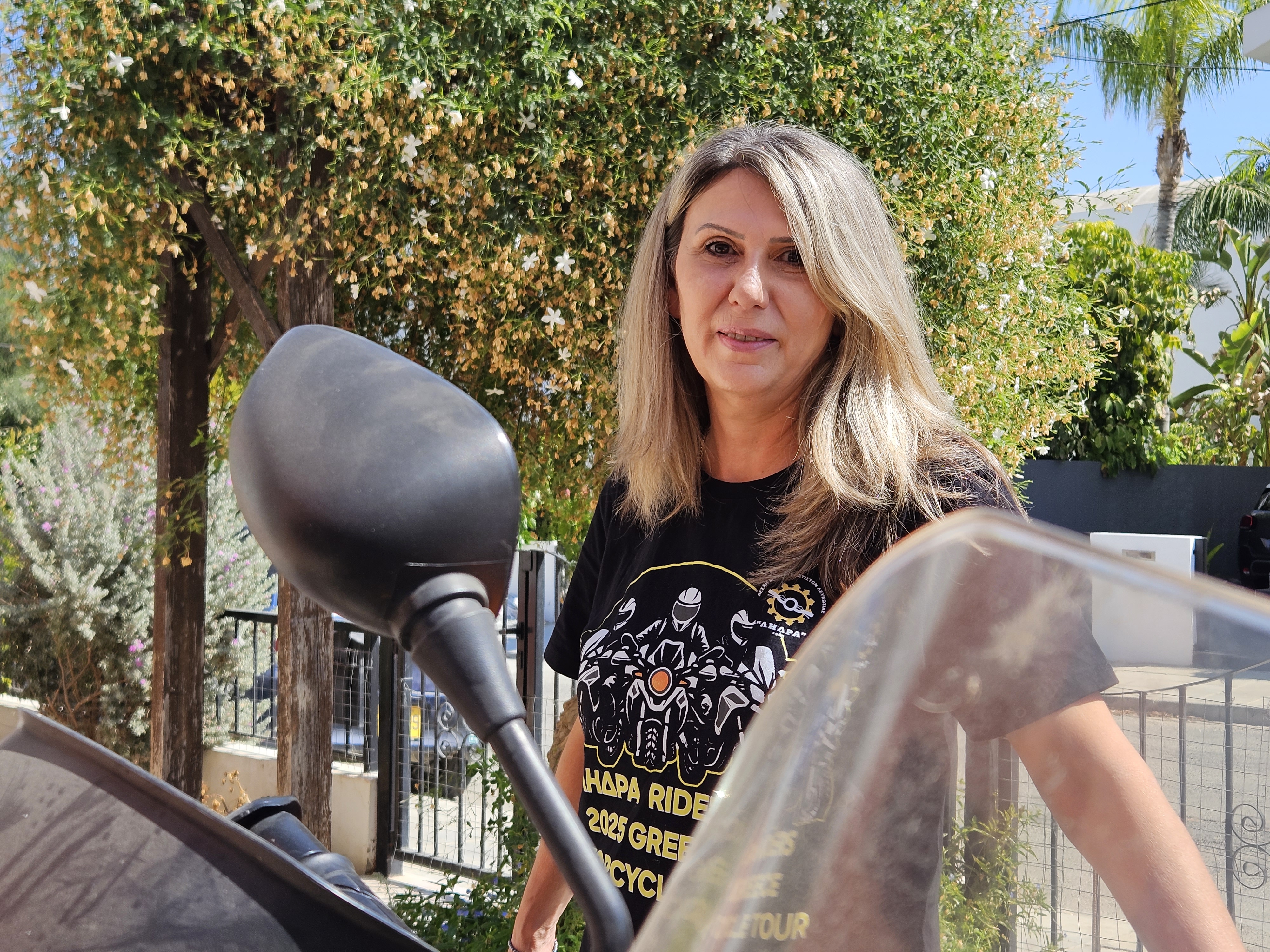The island’s female bikers are putting the macho world of biking in its place
It’s a pleasant Tuesday night in early September, and the street outside the club is buzzing. Tables have been set up, a chatty crowd – with perhaps a disproportionate number of brawny, bearded men in black T-shirts – are tucking into beers and kebabs. Musicians play rembetiko. At the entrance to the road in old Nicosia (it’s a private road, so they’re able to cordon it off), two rows of motorbikes are parked cheek-by-jowl, like a guard of honour.
The people in the crowd are a mixed bunch. Elpida Philippidou, for instance, is a floral designer, having previously spent 20 years as cabin crew for Cyprus Airways. Her sister Suzy Galanou works at a funeral home. Maria Ioannou is a cashier at a department store, and a part-time beautician. Argyri Elia – temporarily behind the bar on this Tuesday night – is among the admin staff at Nicosia general hospital. Club secretary Andri Georgiou is a high-school French teacher.

What these women all have in common, however, is a love of motorcycles. The club in question is the Ledra Motorcycle Club, the oldest of its kind in Cyprus (it recently celebrated its 40th anniversary) – and the ladies are among the growing cohort of female bikers on the island.
Ledra is unisex, though most of its members (around 80 per cent) are men – especially if you only count riders as opposed to passengers and other enthusiasts, an important distinction in Biker World.

Other clubs, somewhat surprisingly, discriminate – even now, with all the various laws on the subject. Some are men-only. Two (Cyprus Women Motorbikers in Limassol and Island Angels in Pissouri) are women-only, as if to redress the balance. Overall, however, it’s fair to say that the macho allure of biking is generally seen as incongruous – not to say incompatible – with being a member of the fairer sex.
“There’s a big taboo,” confirms Elpida at her home on the outskirts of Nicosia, leading the way to the garage to show off her two-wheeled companions – a Harley Davidson, its fuel tank adorned with a ‘Harley Lady’ logo, which her husband Andros (Harley’s chief mechanic in Cyprus) custom-assembled in the 90s, and a Honda CB model (the ‘CB’ stands for ‘City Bike’) which is what she uses to get around, the Harley being more for road trips. “It’s a 500[cc],” she explains. “So it’s like a little bicycle.”
Women bikers face opposition, though. “Some get bullied by their parents. There are women – young women – who may have a motorbike stashed away secretly in a garage somewhere. We get bullying from husbands. Even from the kids.”
It’s just easier for men, she reckons: “Boys and their toys!… And society’s conditioned us to be all about” – she makes dainty gestures, like a girly little thing – “our hair, and our nails, and our jewellery, and our little dresses, and our shoes, and our handbags…”

Elpida is 54, meaning she’s been riding since the dawn of the culture in Cyprus – from around the time Ledra was founded, when powerful motorbikes were a novelty even for men, and the number of women straddling Hogs wasn’t just small but infinitesimal.
“We were breaking stereotypes,” recalls the Cyprus Mail’s own Rebekah Gregoriades, another veteran biker from the same era. “We had fingers pointed at us.”
That said, Elpida and Suzy’s case was quite different. Not only were the family somewhat cosmopolitan, by local standards – Elpida is three-quarters Cypriot, but was born in Canada and lived there till the age of eight – they were also, more importantly, a family of bikers.
Her grandpa never drove a car, going from horses to two-wheelers. He even rode a motorcycle for the Allies in WWII, and was wounded in action. Elpida’s dad rode a bike in the 80s, a Suzuki A100 which was also her personal training bike. “As soon as I finished primary school, my older brother was like, ‘C’mon, let me teach you how to ride’,” she recalls (she later did the same with younger sister Suzy). Two days before her 17th birthday, “my little Chaly appeared in the house”.
This is old-timer talk indeed – the Chaly, the Landy, the Chappy. These were the entry-level bikes (made by Honda, Suzuki and Yamaha, respectively) for a whole generation – at a time when riding a bike, at least in Cyprus, was gloriously unregulated.
Nowadays you have to wear a helmet, of course, and long trousers (as opposed to a dress, if you’re a woman) and even a jacket. Bikers are enjoined to wear boots. Back then, however, says Elpida, “most of them were riding in their flip-flops”.
“Back then, there weren’t so many dangers. Because there weren’t so many cars…”

I’ve arranged to meet Maria Ioannou too, during her lunch break at the department store where she works – but there’s a surprise when I call to confirm the meeting.
“I’m glad you called,” she says. “I was going to call you.” She’s had an accident with the bike, she explains. She’s off work for a while, until her bruises heal.
Later – the interview having been rescheduled to her home in Kaimakli – she reports what happened. She was riding her Honda Rebel on Digeni Akrita avenue, just after the Ayios Antonios traffic lights. “I wasn’t speeding. I was going really slow, because I’d just left the lights.” A taxi (driven by a woman, as it happens) entered from a side road, turning right – and either didn’t see her, or (more likely) assumed the bike would give way. “I have no idea what she was thinking,” says Maria. “They just ignore you on the road.”
When you see a car poised to come in from a side road, confirms Elpida, “you always assume it’s going to come in”.
Getting blocked by a car is probably the most common way of getting hurt as a biker. Had she been speeding, says Maria, she’d surely have been thrown by the impact and landed on the asphalt. In the event, she rammed into her own fuel tank, causing bruising to the stomach and pelvis.
It could’ve been worse, of course. Four years ago, Maria fractured her wrist in another, very similar accident, and was out of action for six weeks. Another biker – a friend’s brother – was killed on the road when he tried to overtake a slow-moving van that suddenly veered to the right, bumping into him. The van had veered to avoid a stationary car, which someone had parked in the road – but the car wasn’t visible from the bike’s vantage point. “It only takes a few seconds.”
Ledra are very active in this regard, organising not just group rides and rembetiko night on Tuesdays, but also regular classes on how to ride safely. The clubhouse is filled with posters and mementos from their storied 40-year history – though I also note an intriguing sticker, for something called Ridegaia.com: ‘Riding a motorcycle is not just getting from A to B. It’s everything in between’.
That’s the point, at the end of the day – the attraction of the sport, for both men and women. That ‘everything in between’, however you choose to define it.
“It’s a way of life,” confirms Elpida. “I cannot imagine myself without riding a bike… If my husband didn’t ride a bike, it’d be a ‘no-go item’ as they say on the airplane. There was no chance I would be in a relationship with someone that doesn’t ride a bike.
“That’s what I’m trying to explain to my daughter – that she should bring us a son-in-law who rides a bike. Or else he won’t fit in the family!”
What exactly makes it so special? “The freedom,” say both Maria and Argyri Elia. It’s a sensual experience, adds Elpida – especially riding out in Nature, in the mountains, surrounded by the bouquet of fragrances or the tang of a chilly day. You’re alert in general, unlike the soporific experience of driving a car.
Is there more? A flavour of rebellion, perhaps, the outlaw culture of bar fights and motorcycle gangs? Sons of Anarchy, ‘Born to be wild’, that kind of thing? Ironically – given what a hard time women face for trying to be part of this macho world – that’s not really true in Cyprus.
“Show me the outlaws in Cyprus!” laughs Elpida when the question is put to her – then shakes her head. “We don’t have Hell’s Angels. We don’t have the drugs…” That said, she adds shrewdly, “there’s a lot of outlaws that do ride bikes”, meaning criminals thinking of a quick getaway and so on. “They’re just not members of clubs.”
Mostly it’s the pleasure of riding – not even speed, just that sense of possibility, an unbridled freedom that appeals to a certain independent streak. “You have to be the solitary type,” reckons Argyri, riding (even with a passenger) being essentially a private, self-sufficient pastime.

Then again, this is where clubs come in. Maria tells of riding to Pomos as a passenger once, feeling so invigorated that she promised herself: “I’m going to do this again on my own, so I’m not depending on someone else to take me”. Later, having started biking again – she used to ride a Landy as a teenager, but stopped to get married and raise kids – she did indeed go to Pomos on her own machine; but she rode with Ledra. A motorcycle club is a kind of support group, allowing individualists to travel in company and find kindred spirits.
And what of women, specifically? Do they get something more out of it?
Not necessarily. “I don’t consider [biking] to be masculine,” says Maria, who admits she can’t even fix a flat tyre. A woman biker doesn’t need to be mannish. There’s no gender issue to speak of.
Still, there may be some secret satisfaction – in breaking stereotypes, as Rebekah put it, and matching the guys at what they believe is their own game.
After all, “you’re not accepted that easily by the boys,” admits Elpida. “You have to prove yourself, that you’re a good rider… OK, they take care of us, the boys. But if you’re going to go on a ride, just boys, you have to be able to keep up.” It’s empowering to prove that you can.
Women bikers have it all, acceptance in a man’s world while also holding on to feminine elegance (Harley, in particular, are making very stylish outfits at the moment) and – why not? – the hair and the nails too. Other women tend to find them inspirational. Maria often gets delighted looks from female drivers when they spot her on the motorcycle; Elpida does Ledra club fundraisers, where they go to schools to amaze little girls with their presence – “And they see us girls, us women, on the bike, and they have the idea that ‘Yeah, we’re allowed’…” A motorbike is potent, it’s iconic. The best part? It’ll get you from A to B too.






Click here to change your cookie preferences